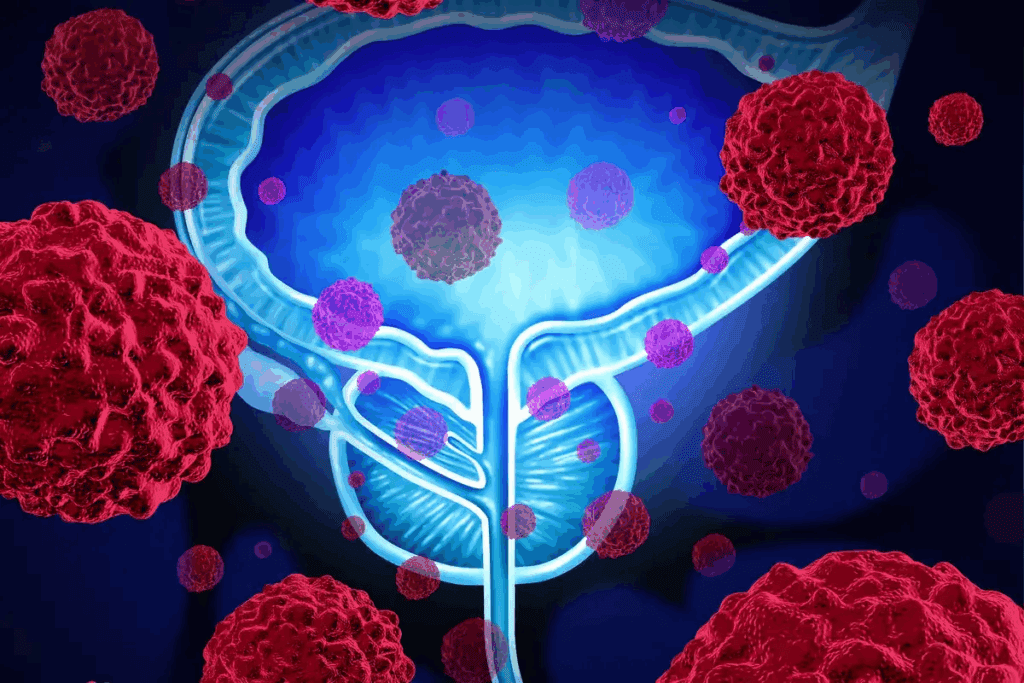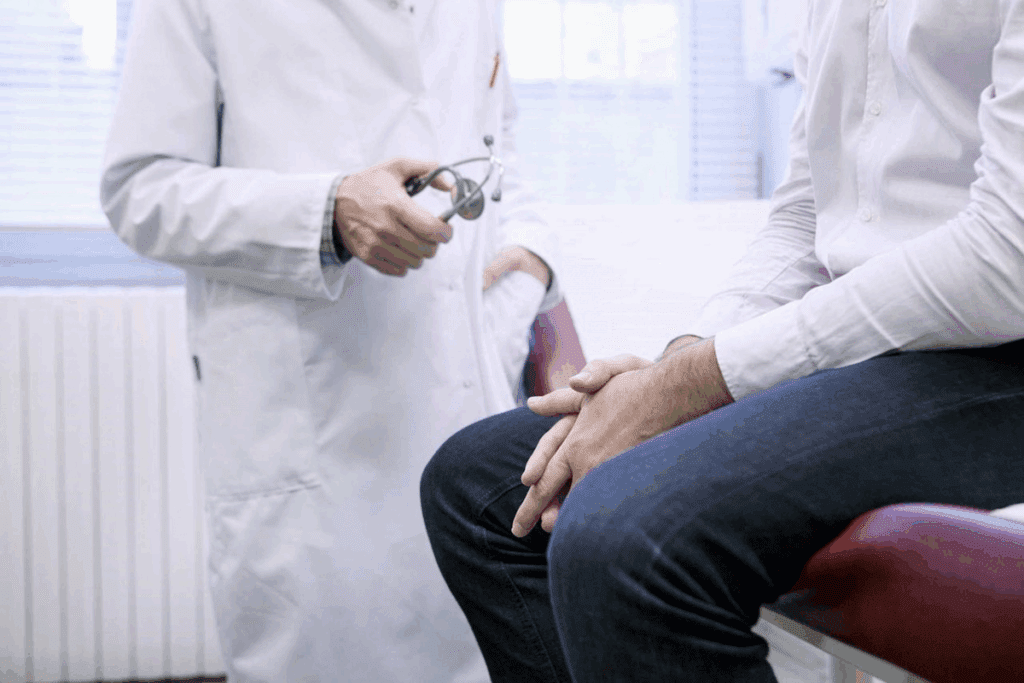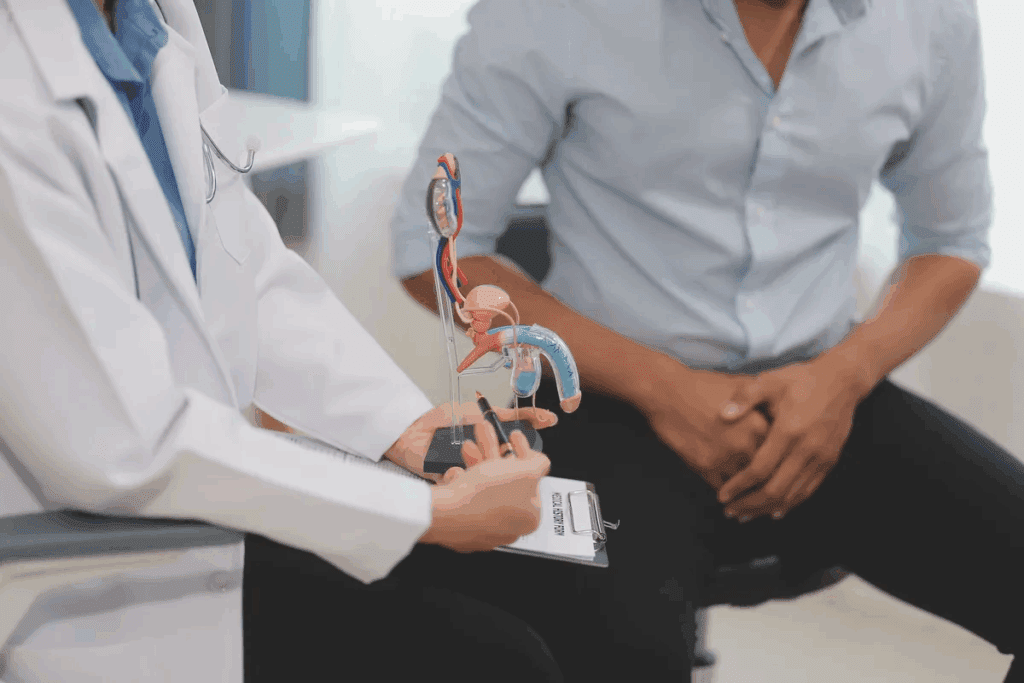
Prostate cancer affects millions of men worldwide, impacting their health and sexual well-being. Erectile dysfunction (ED) is a common worry for men with prostate cancer.Does prostate cancer cause ED (erectile dysfunction)? Understand how the tumor itself can impact nerve function, in addition to treatment effects.
The link between prostate cancer and erectile dysfunction is complex. Prostate cancer itself might not cause ED. But treatments like surgery, radiation, and hormone therapy can harm nerves and blood vessels needed for erections.
Studies show many men face erectile dysfunction after prostate cancer treatment. It’s key for patients to understand this to make better care choices.
Key Takeaways
- Prostate cancer treatments can lead to erectile dysfunction.
- Nerve and blood vessel damage during treatment contributes to ED.
- Understanding the link between prostate cancer and ED is key for patient care.
- Men diagnosed with prostate cancer should talk about their sexual health with their doctor.
- Erectile dysfunction is a big concern for prostate cancer patients’ quality of life
The Relationship Between Prostate Cancer and Erectile Dysfunction
It’s important for patients and doctors to understand how prostate cancer and erectile dysfunction are linked. When a man is diagnosed with prostate cancer, it can affect his sexual health. This often leads to concerns about erectile dysfunction.

Research shows that many men with prostate cancer face erectile dysfunction and lower sexual desire. The rate of ED after treatment varies based on the type of treatment.
Prevalence Statistics in Newly Diagnosed Patients
Studies reveal that 37-48% of men with newly diagnosed prostate cancer struggle with erectile dysfunction. This shows the need for early help and support for sexual health issues.
The high rate of ED among new patients points to the psychological and physical impacts of cancer. These can both play a role in sexual problems.
Understanding the Connection Between Prostate and Sexual Function
The prostate gland is key to male sexual function. Any issue with it, like cancer or treatment, can cause erectile dysfunction. The complex relationship between prostate health and sexual function involves physical, psychological, and emotional factors.
It’s essential to grasp this connection to create effective treatment plans. These plans should improve not just the cancer treatment but also the patient’s overall quality of life.
By recognizing the commonality of erectile dysfunction in prostate cancer patients, healthcare providers can offer better care. This can lead to better outcomes and higher patient satisfaction.
How Prostate Cancer Itself Affects Sexual Function

Prostate cancer can greatly affect a man’s sex life, even before treatment starts. The cancer can change how much sex drive a man has and how well he can get an erection. This is due to both physical and mental reasons.
We will look at how prostate cancer directly affects sex. We’ll see how it impacts sex drive and libido. We’ll consider both the physical effects of the cancer and its mental impact.
Direct Physical Effects of the Cancer
The physical presence of prostate cancer can harm sex function. As the cancer grows, it can damage the nerves needed for erections. This can cause erectile dysfunction (ED), where men can’t get or keep an erection for sex.
The physical effects of prostate cancer on sex can be big. Research shows that prostate cancer can cause ED. The impact depends on the cancer’s stage and location.
Impact on Sexual Desire and Libido
Prostate cancer can also lower a man’s sex drive and libido. The stress of having cancer and its physical symptoms can make sex less appealing. Anxiety and depression, common in men with prostate cancer, can make things worse.
The effect of prostate cancer on sex drive and libido is complex. It involves both physical and mental factors. It’s important to address these changes to help men with prostate cancer fully.
- The physical presence of the cancer can cause discomfort and pain, affecting sexual function.
- Psychological factors, including anxiety and depression, can decrease sexual desire.
- The overall burden of cancer diagnosis can impact a man’s libido and sexual well-being.
Does Prostate Cancer Cause ED? Understanding the Mechanisms
It’s important to know how prostate cancer leads to erectile dysfunction (ED). This knowledge helps in finding better treatments. Prostate cancer can change how a man’s body works, affecting his quality of life.
Physiological Pathways Affected by Prostate Cancer
Prostate cancer impacts erectile function in several ways. Nerve damage is a big factor. The nerves around the prostate are key for erections. Cancer or treatments can harm these nerves, causing ED.
Also, vascular changes can happen, affecting blood flow to the penis. This blood flow is needed for erections. Hormonal alterations, like changes in testosterone, can also affect sexual function.
Baseline ED in Newly Diagnosed Patients (37-48%)
Research shows many men already have ED when they’re diagnosed with prostate cancer. The numbers vary, but 37% to 48% of men have ED at diagnosis. This shows ED is common even before treatment starts.
- Pre-existing ED may get worse because of the stress of a cancer diagnosis.
- ED at diagnosis could be due to the cancer or other health issues.
Progression of Sexual Dysfunction with Disease Advancement
As prostate cancer gets worse, sexual problems like ED get more common and severe. The disease can cause more nerve damage, less blood flow, and hormonal changes. These changes make erections harder to get and keep.
By studying how prostate cancer causes ED, we can improve care. We need to treat both the cancer and its effects on sex. This helps men with prostate cancer keep their sexual health and improve their life quality.
Radical Prostatectomy and Erectile Dysfunction
Radical prostatectomy, or the removal of the prostate gland, is a major risk for erectile dysfunction (ED). This surgery saves many lives but can harm a man’s quality of life. It can affect his ability to have an erection.
Impact on Nerve Function and Blood Flow
Radical prostatectomy can harm nerves and blood vessels near the prostate. These are key for erections. Nerve damage is a big worry because it can stop a man from getting or keeping an erection.
“The nerves near the prostate are at risk during surgery,” a study says. This risk shows why surgeons must be very careful to avoid nerve damage.
Nerve-Sparing Techniques and Their Effectiveness
To lower the risk of ED, surgeons use nerve-sparing techniques. These methods try to keep the nerves around the prostate intact. This helps keep erectile function. How well these techniques work depends on the surgeon and the patient’s health.
A study showed that nerve-sparing surgery can greatly reduce ED risk. Using these techniques can help men keep their erectile function after prostate cancer surgery.
Erectile Dysfunction Rates After Surgery
Even with better surgery methods, many men face ED after radical prostatectomy. Up to 65% may get ED within five years. The risk depends on age, how well a man could get an erection before surgery, and the surgery method.
Men having radical prostatectomy should talk to their doctors about ED risk. Knowing about the possible effects can help men prepare for life after surgery.
Radiation Therapy’s Effect on Sexual Function
Radiation therapy for prostate cancer can cause sexual problems. The severity depends on the type and dose of radiation. It’s a common treatment, and knowing its effects on sex is key for patient care.
External Beam Radiation vs. Brachytherapy
There are two main types of radiation therapy for prostate cancer: External Beam Radiation Therapy (EBRT) and Brachytherapy. EBRT sends radiation from outside the body to the prostate. Brachytherapy places radioactive material inside the prostate.
Both can affect sexual function, but in different ways. EBRT might harm more tissues, affecting sex more. Brachytherapy, being more focused, could have different side effects.
Gradual Development of ED After Radiation
Erectile dysfunction (ED) can start slowly after radiation therapy. Studies show 33% to 85% of patients might face ED. The time it takes to notice ED can vary, as radiation affects nerves and blood vessels over time.
Comparing Short and Long-term Sexual Outcomes
It’s important to look at both short and long-term effects of radiation therapy on sex. The type of radiation and the patient’s health matter. Short-term effects might be temporary, while long-term effects, like ED, can last longer.
Treatment Type | Short-term ED Rate | Long-term ED Rate |
External Beam Radiation | 20-40% | 50-70% |
Brachytherapy | 15-30% | 40-60% |
Knowing these differences helps patients and doctors make better choices. It also helps manage expectations about sexual health after treatment.
Hormone Therapy and Sexual Side Effects
Hormone therapy, like androgen deprivation therapy (ADT), is a common treatment for prostate cancer. It affects sexual function a lot. ADT lowers testosterone, causing many sexual side effects.
Impact on Testosterone Levels
ADT reduces male hormones, like testosterone, which prostate cancer cells need to grow. But, this drop in testosterone affects sexual function a lot. Low testosterone levels are linked to less sex drive and erectile dysfunction.
Testosterone is key for sex desire and function. When ADT lowers it, sex interest and ability go down. This affects the quality of life for many prostate cancer patients.
Erectile Dysfunction Rates During ADT Treatment
Research shows most patients on ADT face erectile dysfunction. About 94% of patients on ADT report some degree of ED. This is a big worry for those getting this treatment.
These ED rates show the need for full care that includes sexual health. Doctors should talk about these side effects and look for ways to manage them.
Intermittent vs. Continuous Hormone Therapy
Hormone therapy can be done in different ways, like intermittent and continuous ADT. Intermittent ADT has treatment cycles with breaks, while continuous ADT goes on without stops.
- Intermittent ADT might lessen some sexual side effects by letting testosterone levels recover during breaks.
- Continuous ADT keeps testosterone levels low, possibly causing more lasting sexual problems.
Choosing between intermittent and continuous ADT depends on many things. These include the patient’s health, cancer stage, and what they prefer about treatment side effects.
Psychological Impact of Prostate Cancer on Sexual Health
Getting a prostate cancer diagnosis can deeply affect a person’s sexual health and overall well-being. The news and the treatment process can bring up big emotional and psychological hurdles.
Anxiety and Depression Following Diagnosis
Being told you have prostate cancer can change your life. It often makes people feel anxious and depressed. The worry about what the future holds, fear of treatment results, and changes in sex life add to these feelings. Many studies show that a lot of men feel anxious and depressed after finding out they have prostate cancer.
These feelings can be as tough as the physical symptoms. They can make it hard for a person to enjoy life and deal with the disease.
Relationship Changes and Communication Challenges
Prostate cancer and its treatment can also change relationships, like those with a partner. Changes in sex life and closeness can cause communication problems and put a strain on the relationship. Partners might find it hard to understand what the patient is going through, making them feel left out.
Talking openly is key during this time. Sharing feelings, fears, and hopes can make the relationship stronger. It helps create a supportive space for both partners.
Body Image and Masculinity Concerns
Prostate cancer and its treatment can also mess with how a man sees his body and his masculinity. Changes in sex life, urinary issues, or other physical changes can make a person worry about body image and being a man. These worries can make a person feel not good enough and low in self-esteem.
Dealing with these worries needs a full approach that includes talking to a psychologist. By understanding the emotional and psychological effects of prostate cancer, doctors can give better care. This care is more than just treating the physical symptoms.
The psychological effects of prostate cancer on sex life are complex and need careful thought and support. By getting how emotional and psychological challenges affect patients, we can offer better care. This care can improve their life quality.
Treatment Options for ED After Prostate Cancer
Men who have had prostate cancer and now face ED have many ways to regain their sexual health. Erectile dysfunction is a common side effect of prostate cancer treatment. Luckily, there are several effective treatments to help restore sexual function.
Oral Medications (PDE5 Inhibitors)
Oral medications, like PDE5 inhibitors, are often the first choice for treating ED after prostate cancer. These drugs help by increasing blood flow to the penis. Sildenafil (Viagra), Tadalafil (Cialis), and Vardenafil (Levitra) are common PDE5 inhibitors. Research shows they work well for many men with ED after prostate cancer treatment.
PDE5 Inhibitor | Brand Name | Dosage |
Sildenafil | Viagra | 25mg, 50mg, 100mg |
Tadalafil | Cialis | 2.5mg, 5mg, 10mg, 20mg |
Vardenafil | Levitra | 5mg, 10mg, 20mg |
Mechanical Devices and Injections
Men who don’t respond to oral meds or prefer other options have mechanical devices and injections. Vacuum erection devices (VEDs) are non-invasive and can be effective. They work by creating a vacuum around the penis, drawing blood into it, and then using a constriction ring to maintain the erection.
Intracavernosal injections involve injecting medication directly into the penis to induce an erection. Alprostadil is a common medication used for this purpose. While effective, injections can be associated with pain and priapism (prolonged erection).
Penile Implants and Surgical Interventions
For some men, penile implants are a highly effective and satisfying treatment for ED. There are two main types of penile implants: inflatable and semi-rigid. Inflatable implants are more commonly used as they allow for a more natural erection and are easier to conceal when not in use. Surgical interventions like penile implants are typically considered when other treatments have failed.
We understand that dealing with ED after prostate cancer can be challenging. But, with the range of treatment options available, men can find a solution that suits their needs and improves their quality of life.
Conclusion: Living with Changed Sexual Function After Prostate Cancer
Prostate cancer and its treatments can greatly affect a man’s sex life, causing erectile dysfunction (ED). It’s key to understand how prostate cancer and ED are linked. This knowledge helps in managing and treating ED effectively.
We’ve talked about how different treatments, like surgery, radiation, and hormone therapy, can impact sex. These treatments are vital for fighting prostate cancer. Yet, they can deeply affect a man’s quality of life, mainly his sexual health.
Dealing with changed sexual function after prostate cancer needs a full approach. It must cover both physical and emotional needs. By knowing the causes and effects of ED, patients and doctors can find ways to manage it. This includes using medicines, devices, and making lifestyle changes.
Many men worry if prostate cancer causes erectile dysfunction. By facing this worry and providing the right support, we can help men with prostate cancer. We can help them live a fulfilling life, including their sexual health.
FAQ
Does prostate cancer directly cause erectile dysfunction?
Prostate cancer itself might not directly cause erectile dysfunction. But treatments like surgery, radiation, and hormone therapy often do. The cancer itself can also change how you have sex.
How common is erectile dysfunction among prostate cancer patients?
Many prostate cancer patients face erectile dysfunction. Studies show 37-48% of new patients have ED. The exact number depends on the cancer’s stage and treatment.
Can radical prostatectomy cause erectile dysfunction?
Yes, radical prostatectomy can lead to erectile dysfunction. This is because it damages nerves and blood vessels needed for an erection. Even with nerve-sparing techniques, up to 65% of patients may experience ED within five years.
How does radiation therapy affect sexual function?
Radiation therapy can cause erectile dysfunction. The risk and when it happens vary. Between 33-85% of patients get ED after radiation. The type and dose of radiation play a role.
What are the sexual side effects of hormone therapy for prostate cancer?
Hormone therapy, like androgen deprivation therapy (ADT), can lower testosterone. This leads to erectile dysfunction in about 94% of patients. It also affects libido and overall sexual health.
Are there effective treatments for erectile dysfunction after prostate cancer?
Yes, there are many treatments for ED after prostate cancer. Options include oral medications, mechanical devices, injections, and surgical implants. The right treatment depends on the patient’s condition and what they prefer.
How does prostate cancer diagnosis affect sexual desire and libido?
A prostate cancer diagnosis can affect your sex drive and libido. It can cause anxiety and depression, which can lower your sex drive. The cancer and its treatment can also change your sexual function and libido.
Can prostate cancer treatment be tailored to minimize the risk of erectile dysfunction?
While not all treatments can avoid ED, some can reduce the risk. Techniques like nerve-sparing surgery and careful radiation planning help. Talking to your healthcare provider about your concerns is key to finding the right treatment plan.
What is the impact of prostate cancer on relationships and communication about sexual health?
Prostate cancer can change your relationships and how you talk about sex. It can affect your intimacy and emotional connection. It’s important to openly discuss your sexual health and how treatments impact you.
How can patients address body image and masculinity concerns related to prostate cancer?
Patients can talk about their feelings with healthcare providers, partners, or support groups. Understanding the physical and emotional effects of prostate cancer and its treatment can help manage these concerns.
References
Kanno, T., Kubota, M., Sakamoto, H., Higashi, Y., Nomi, H., Okada, Y., & Morozumi, M. (2020). The natural history of asymptomatic renal stones ≤5 mm. World Journal of Urology, 38(12), 3163–3169. https://pubmed.ncbi.nlm.nih.gov/32703025/























